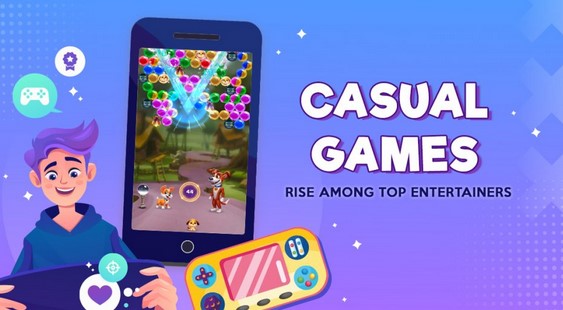Casual games have become a ubiquitous form of entertainment, offering accessible and enjoyable experiences for players of all ages and backgrounds. This article explores the rise of casual games, their impact on the gaming industry, and why they continue to captivate audiences worldwide.

Defining Casual Games
Casual games, often referred to as “casual gaming,” encompass a broad range of video games designed for ease of play and accessibility. These games prioritize simplicity and enjoyment, making them appealing to both avid gamers and newcomers.
Accessible Gameplay
The hallmark of casual games is their accessibility. They feature straightforward mechanics, intuitive controls, and minimal learning curves. Players can quickly grasp the gameplay, allowing for instant enjoyment without the need for extensive tutorials.
Diverse Genres
Casual games span various genres, from puzzles and match-three to simulation and endless runners. This diversity caters to a wide audience, ensuring that everyone can find a casual game that suits their preferences.
The Mobile Revolution
The proliferation of smartphones played a pivotal role in the ascent of casual games. Mobile app stores, such as the Apple App Store and Google Play, provided a platform for developers to reach a massive audience. Titles like “Candy Crush Saga” and “Angry Birds” became cultural phenomena, captivating players worldwide.
Social Integration
Casual games often incorporate social elements, allowing players to connect with friends and family. Features like leaderboards, multiplayer modes, and in-game challenges create a sense of community and friendly competition.
Pick-Up-and-Play Appeal
Casual games are designed for short play sessions, making them ideal for on-the-go entertainment. Players can enjoy a quick game during a commute, while waiting in line, or during breaks, providing a brief escape from daily routines.
Inclusivity and Accessibility
Casual games prioritize inclusivity, welcoming players of all skill levels and demographics. This accessibility has expanded the gaming audience, breaking down traditional barriers and stereotypes.
Free-to-Play and Microtransactions
Many casual games adopt a free-to-play model, allowing players to access the core gameplay at no cost. Developers monetize these games through microtransactions, offering in-game items or cosmetics. This approach ensures that players can enjoy casual games without significant financial commitment.
Brain-Training and Cognitive Benefits
Certain casual games, such as brain-training apps and educational titles, offer cognitive benefits. They stimulate mental activity, improve memory, and enhance problem-solving skills, making them popular among individuals seeking both entertainment and mental exercise.
The Impact on Gaming Industry
The success of casual games has had a profound impact on the gaming industry. Here are some key influences:
- Diversification of Audience: Casual games expanded the gaming audience, attracting players who may not have engaged with traditional video games.
- Market Growth: The casual gaming market grew substantially, driving revenue and opportunities for developers and publishers.
- Development Trends: Even within traditional gaming, developers adopted casual gaming elements, such as accessible controls and shorter play sessions.
The Future of Casual Games
Casual games continue to evolve with advancements in technology and player expectations. Here are some trends shaping the future:
- Augmented Reality (AR) and Virtual Reality (VR): AR and VR technologies are enhancing casual gaming experiences, providing immersive gameplay and new levels of interactivity.
- Cross-Platform Play: Many casual games now support cross-platform play, allowing friends on different devices to enjoy games together.
- Sustainability and Ethical Monetization: Developers are exploring sustainable monetization models that prioritize player satisfaction and ethical practices.
Conclusion: The Enduring Appeal of Casual Games
Casual games have transformed the gaming landscape, offering enjoyable experiences that resonate with players of all backgrounds. Their accessibility, inclusivity, and diverse offerings continue to attract a broad audience, making casual games a significant and enduring force in the gaming industry. As technology continues to advance, the future holds exciting possibilities for the world of casual gaming, ensuring that its appeal remains evergreen.











